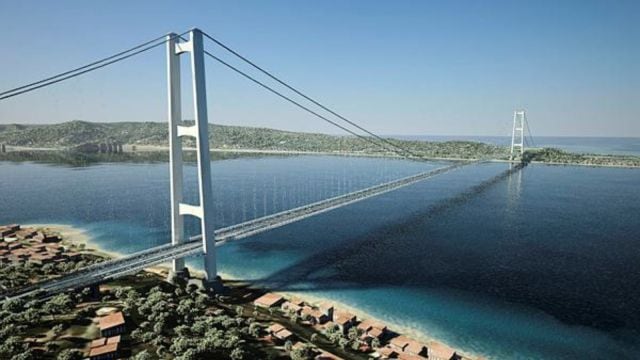Stay updated with the latest - Click here to follow us on Instagram
Rome approves construction of world’s longest suspension bridge
Rome hopes to classify the bridge as a military expenditure, allowing it to count toward NATO’s 5% GDP defence spending target.
 This digital rendering shows a bridge linking the Italian mainland with Sicily. (AP Photo)
This digital rendering shows a bridge linking the Italian mainland with Sicily. (AP Photo)Despite decades of financial and environmental delays, Italy on Wednesday finally approved the construction of what will be the world’s longest suspension bridge, connecting the island of Sicily to the mainland region of Calabria.
The 3.7 kilometer bridge will be built on one of the most seismically active areas in the Mediterranean. With the ability to withstand earthquakes, the bridge will break the record currently held by Turkey’s Canakkale Bridge across the Dardanelles.
The bridge is a part of the Messina Bridge project, a latest attempt by Italian officials, and will create over 120,000 jobs a year. Italian Transport minister Matteo Salvini said the bridge will bring economic growth to the area, as the regions of Sicilia and Calabria are two of the poorest in Europe.
Prime Minister Georgia Meloni Wednesday said that the project has not been easy and that she considers it as an “investment for the present and future”.
“We enjoy difficult challenges when they make sense,” Meloni said, as quoted by BBC.
Meloni government has also set aside 13.5 billion euros ($15.63 billion) over the next 10 years to build it and surrounding facilities.
According to the final project, the bridge over the Messina strait will span 3.3km (2.05 miles) and stretch between two 400-metre (1,300 feet) high towers, with two railway lines in the middle and three lanes of traffic on either side.
Rome hopes to classify the bridge as a military expenditure, allowing it to count toward NATO’s 5% GDP defence spending target.
However, the project will require to go through a clearance by Italian Court of Auditors as well as environmental agencies, at both, national and state level.
This isn’t the first time the project has seen a halt. Since the first time the project was announced, which was approximately 50 years ago, multiple proposals for the bridge have been shelved over the years for different reasons, and it has long faced strong opposition.
The opposition includes local residents on either side of the strait, whose properties may be seized, and could legally challenge the decision, meaning the construction of the bridge may be delayed or stalled altogether.
Local politicians have expressed their unhappiness amid concerns that huge amounts of taxpayers’ money would be siphoned off by the Sicilian and Calabrian mafias, which have a broad influence over politics and society in southern Italy.
Local groups have also opposed the bridge, saying its construction would use millions of litres of water a day while both Sicily and Calabria regularly struggle with drought.
(With inputs from BBC, Reuters)




- 01
- 02
- 03
- 04
- 05



























